- Home
- Anson Cameron
Boyhoodlum
Boyhoodlum Read online
About the Book
You know those childhood memoirs that tell of the innocence of youth, of a gentle past when boys and girls were adorable and agreeable, respectful of their elders, and spoke only when spoken to? This isn’t one of those.
Boyhoodlum is the hilarious confession of an ingeniously devious and destructive boy. In the late 1960s and early ’70s, Anson Cameron waged guerrilla war on his hometown in country Victoria. When he wasn’t blowing his family TV to smithereens, he was electrocuting a friend’s mother; when he wasn’t raining expletives on a genial deaf neighbour, he was raining missiles on classical music fans. And in his leisure hours, he found time to join a Wee Club, stockpiling an ocean of urine for future use.
Knowing he was destined for greatness, young Anson saw no reason to keep his self-importance to Napoleonic levels. At high school, a posse of hirsute male teachers attempted to put the errant lad in his place. But would the ‘wonderbeards’ be able to quell a born entertainer and agitator?
Brilliantly evoking an era in which the Cisco Kid, Valiant Chargers and the lethal powers of a home-made shanghai reigned supreme, Anson Cameron’s riotous memoir is a crash-investigator’s report on how not to be a boy.
Contents
Cover
About the Book
Title Page
Dedication
Foreword
Begin Reading
Acknowledgements
About the Author
Also by Anson Cameron
Copyright Notice
To Sarah, Asta and Freya
FOREWORD
Memoir is detection, invention, architecture, curatorship and veneration. It is the resurrection and culling of a million lived or imagined moments down to the few you can stomach and sell. In which section does it belong? Fiction? Or the other? The reconstruction of a dead world using the flotsam you find on the beach of your dotage-mind … a tusk, a mask and a seed from a fever tree have washed ashore – now recreate Africa.
The vermilion of your favourite pencil, the twisted secrets of a stuffed bear, the moods of a sister, the musk of your waking mother, the topography of your neighbourhood when held aloft in your father’s arms, the night sounds of your first house, the high place where a branch joined a trunk, despair’s first touch, love …
The past is limitlessly malleable. Facts die when tense changes. Memory has lain in a skull-sized crypt, mouldering, curing, mutating. There is no sure tool of archeology to work in such a space with such alchemic stuff. Truths will be different when they come out than when they went in. The lure of humour, the mirrored hall of ego, and the yen for invention, have distorted my boyhood world. If there is a moral responsibility to those who were there that I get this right … well, I haven’t. So to those people I say sorry. And I say write your own book and see how The Past fucks with you.
I guess I was hoping, during the writing of this boyhood, not to meet myself. To be able to keep that once-upon-a-me at arm’s length. Knowing and dreading I was likely to come face-to-face with a solipsistic little prick who used people for play. If I wrote honestly it would be ugly, I was sure of that. So I began to write a lie about a boy I never met. Then I realised, that’s just adulthood – that soft calibration of self. And I’ve been given a chance to tell the truth. To enter the confessional of posterity and sing like a canary.
So, I’m turning myself in. If you meet a little prick here, well, at least you’ve only had to meet him retrospectively, in the telling. I ask forgiveness from all those who had to meet the flesh-and-blood liar I was as a boy. He was combative, insidious, dishonest, and a vindictive vandal who needed violence visited upon him by someone who knew the line where a kicking turns from altruism to harm.
It will make you smile in wonder at the human gift for redemption that such a despicable boy could turn into such an honest writer and good and gracious man. You might then knit your brow, wonder if the boy was really a good boy, being painted bad by a wicked man for laughs. Don’t. That boy, the boy I was, was bad.
But Shepparton was a big enough town that as a kid you could never be known by all its adults. There would always be suckers who didn’t suspect I was a manipulative kid whose dreams were realer than their lives. I had blond hair and a smile that was a bigger fraud than organised religion. These gave me an edge.
In my defence – my fate was known from birth. Like a cancer-sufferer, or a Prince, whatever I did in my fledgling years was of little importance – Death or the Kingdom waited regardless. My childhood was always going to end with me being handed a sportscoat and a tie and riding off to a faraway castle for singular young people called Geelong Grammar. And all this – the minor boyhood, the infancy, the neighbours, the schooling, the friends and the town – would be replaced by another boyhood and better schooling and permanent friends and a city. This town and everyone in it, my world, was going to be substituted for a better one when the time came. That was the contract as sold to me in my cot.
So this first chapter of life was mine to do with as I pleased, I figured. I had free rein to treat the town the way other kids treated their ant farms. One day I’d drip honey on it, the next day I’d raise it up and shake it to see its inhabitants run cursing for shelter … then, of course, there was fire.
I couldn’t lose a friend who wasn’t going to be lost anyway when I went away. Like a person of Faith, I was born with a glowing afterlife. But mine would begin at thirteen in the cradle of the plutocracy, where all the habits of living my first baker’s dozen years in Shepparton would be slowly unlearnt and my sins forgotten and I would sit at the right hand of some genuine big shots. It made for a pretty free childhood, the knowledge that this life ended at thirteen.
Anson Cameron
In the beginning our house in Talinga Crescent was the world entire. Mum prepared meals in the kitchen and wrote letters home on blue airmail envelopes. Dad laughed and gave us horsey rides upstairs to bed and read us stories there. This world slowly expanded with the scream of cicadas and the shouts of football players echoing through the bush across the levee to the Goulburn River where swagmen and blackfellas lived rough on the banks.
Then downtown, to the places a boy was hopelessly drawn to: Halpin’s Sports Store and Thompson’s Gun Shop, where you would press your nose against the glass to look at the sheath knives and shotguns; and Darveniza’s Newsagency with the lure of Donald Duck and Phantom comics; or Every’s Bookshop which stocked the Secret Seven and penny bungers and sky rockets.
Later, there was Taverna Pizza, exotic and continental, mozzarella and mushrooms, wild new tastes for a mutton and potato town. The Taiwan Cafe, where you could take a billy and have it filled with fried rice. And the cafe in Wyndham Street where we would gather and sip our first cappuccinos and talk to the world’s first girls.
Outside The Hurco Cafe, Fido Thompson and his crew smoked and leaned. Flared jeans and long hair and always up for a fight. You didn’t look sideways at them as you walked past. The Hurco made the best hamburgers and Blue Heaven milkshakes in the world. Aspiring thugs circled the block endlessly in souped-up Monaros and Chargers and Studebakers, raised high on their wheels, snarling as they passed the cafe.
In summer we went down to the Goulburn River with rafts that took us weeks to scavenge and build and sank immediately and without trace while we watched, sickening ourselves with Marlboros. Then to the Raymond West Pool where we smashed ourselves into the water from frightening heights to impress girls who sat in circles outwardly oblivious but (I still hope to this day) inwardly thrilled. Each year a fruit picker would be pulled duck-egg-blue dead from the brown water and the whisper would go through the crowd, ‘A Queenslander. A Queenslander.’ As if that word explained how cheap life could be.
We had some poor in t
own; but they were no-shoes poor, not no-food poor. Back then it was just the Aboriginals and the Greeks and Italians and Turks and us; skips or Anglos or whatever we were. I just thought we were people.
We’d ride our bikes through the bush along the rivers where lone fishermen waited for redfin and couples plied their libidos in old Holdens. Pick our feet up off the pedals and put them on the crossbar away from snakes and dogs. The town was surrounded by orchards and dairy farms and bush and you could ride into them forever.
Older, the world got bigger still – to the north on weekends there was the Murray and water-skiing and fishing and swimming and crayfishing. To the east, a shack in the mountains surrounded by forest and eucalypt air and clear streams. To the south a city with bluestone buildings and skyscrapers and trams and cops wearing white gloves waving endless traffic. But we rarely went there. Many Sheppartonians had never been. Going to Melbourne meant you had extreme legal or dental problems, or you had an unhealthy desire to see Richmond play football in colour, or to hear The Mikado performed with a live orchestra. The few who went to Melbourne often were viewed with suspicion. Aspirational malcontents. There was nothing Shepp didn’t have that an honest person could want. And she felt, to us, like the capital of some vast country, a sovereign state, a proud Byzantium. We were an isolated people, and it was easy to feel proud among small neighbours like Mooroopna and Nathalia.
Not everyone knew everyone back then, but everyone at least knew of everyone. There was a familial bond that comes with isolation. People didn’t move about much and we were all castaway in this hometown together.
But … retract from Victoria and its places, into Shepparton and its people, and further, into the intimacy of our crescent and neighbours, and still further, back into the house, into the conjoined psyche of the family, where only moments ago we met Mum writing letters home to England and Dad giving us horsey rides … retract even further … before I knew anyone, I was alone in bed, and there was dread.
Dread is my earliest memory. Being the youngest of four, I was made to go to bed early. First. Alone. Upstairs in an old house miles away from my family, who then spent happy evenings clustered around the TV together. Some nights their laughter drifted up the stairs to me. Some nights the sound of my brother Guy breaking a chair over my eldest sister Debbie’s head. It was the right thing to do. Everyone who knew that sister wanted to break a chair on her head. But mostly I heard the distant symphony of a loving family, and thus the sound of profound exclusion.
They lay about downstairs guffawing at the idiocies of the hillbilly dolt Pa Kettle, Mum in the big vinyl armchair, knitting jumpers for them, Dad relaxed by beer into lying on the floor alongside his children while they gummed Eskimo Pies with their semi-renovated teeth. They were an antipodean Ancien Régime, a debauchery of confectionary and hilarity so acute it invited revolution. And me, I sobbed alone, aloft, a blond dauphin locked in a tower of ghouls. Downstairs was a royal court. Upstairs I lay on the rack. Rattle-Rattle.
Some nights I’d sneak down there and stand pixie-quiet with all my famous smartarsery leeched from me, at the back of the living room, comforted to be … well, not in the bosom of my family, but at least in the bleachers. And safe, momentarily, from the ghouls stalking about upstairs. The sounds of family fun would mask my presence for a while. The slurping of hot Milo, riddles and jokes told, compliments and affections passed one to another, wind amusingly broken. But soon enough Dad, without even looking round, would ask, ‘What is it this time?’ I don’t know why he asked. He knew what it was. They all did. The bastards. I’d look down at my bare feet and mumble, ‘Rattle-Rattle.’
‘Oh, God,’ they would say. ‘Oh no. Are you kidding? We solved Rattle-Rattle. Rattle-Rattle is debunked, done and dusted. Go to bed, Boyboy.’
But Rattle-Rattle, like all archenemies, had a new life for each volume, a new plan for each episode, fresh dread for each new night. Vampires, werewolves, the Joker, the Vietcong … burn them alive and they stalked you next night alive again and giving off a stink of singed hair. So kill off Rattle-Rattle with your assurances it was just the wind. Rattle-Rattle only needs a tiny cluster of cells fertilised by darkness to reform and rise again and stalk the upper floor.
Our house was old and wood framed, and on summer nights as the heat ebbed from it it creaked and cracked as it contracted. I know this now. These many years later I can still hear those sounds, and they make perfect sense; a weary house sighing and relaxing, the sun’s warehoused energy leaking back into the night. But as a small boy lying upstairs in bed, each sound was the creak of a loose floorboard as mustachioed men in black fedoras crept toward my room.
Most nights, after lying stone dead breathless in bed for dark eons as these crepuscular creeps crept creakily closer, I would break out and begin to shout, ‘Rattle-Rattle. Rattle-Rattle. Rattle-Rattle …’ I was young with a puny vocabulary and Rattle-Rattle was the only way I could describe the noises. They were without beat or tempo, suggestive of a madman’s sporadic gait.
No wonder whichever amused family members arrived in my small bedroom to answer my alarm, brushing heartbreaking shards of Violet Crumble from their cardigans, were perplexed at my white-faced terror. A guessing game would begin. ‘Was it a willy-wagtail?’ Mum would ask. I’d shake my head. ‘What about a possum?’ Dad would ask. No. ‘Cicadas?’ What fools they were. Or maybe they were deliberately taunting me with wildly inaccurate guesses. Rattle-Rattle was clearly the sound of a mustachioed man in a big hat creeping up the stairs toward me.
‘What colour hat?’ Dad would ask, when I got that message across. ‘Because blokes in brown hats use a kukri, but blokes in black hats prefer a garrote.’
‘Blokes in slouch hats carry a knife and fork,’ Guy added. ‘And a small bottle of mint sauce. Boys taste best with mint sauce. You didn’t smell mint sauce, did you?’ Well, no. Not until Guy asked that question. But it was all I smelt after it. The mint patch in our garden became a kind of aromatic memento mori, a potpourri of cannibalistic doom.
The guessing game would go on until the family tired of it; there was no pausing the TV, and Pa Kettle, though a lazybones in excelsis, could cause about ten different kinds of mayhem during a Rattle-Rattle investigation. They would drift back downstairs calling ‘Rattle-Rattle’ hilariously, loudly telling each other I was a chicken spooked by a wagtail.
Alone in the dark, given the suggestions they’d made, I was invariably more frightened after my family held a Rattle-Rattle investigation than before. One whole summer I lay awake with my eyes scrunched head-achingly tight waiting for the fatal drip of mint sauce on my forehead. I imagined my skeletal remains lying in my cot surrounded by a puddle of red jelly the way a leg of lamb lay on a plate in the fridge. There’d be a pleasant whiff of mint in the air when Mum found me.
They joked about Rattle-Rattle for years, as if it were a proper topic for reminiscence, me sharing my bedroom with a cannibal in an akubra while they held their hillbilly debauch of Eskimo Pies down below. They told me I was a boy-coward. But I say if you are burdened with an imagination that can transform a stanza of micro-creaks into a fully fleshed, nattily dressed hunchback, then you are a hero to have survived the infinite bestiary of your childhood. Only dimwitted children with slate-grey minds sleep easily. My siblings, when they finally came to bed, after Pa Kettle and Polly Waffles and tickles from Dad, snored like tranquillised rhinos.
Later, with Rattle-Rattle finally dead, sprinklers ticked green time in the garden while I went to sleep. It was a cavernous house, its symphony of faint architectural stresses playing distantly through the night into my dreams. Creeping hoodlums and tiptoeing witches spent themselves in endless, pointless perambulation. But by now the ghouls and I had a détente, we had borders; as long as I stayed in my bed they wouldn’t come to me. By dawn they were exhausted, and retreated to rest in their netherworld as the magpies began to carol and the horseclop of the baker delivering warm bread in waxed paper alerted me to hunger and set my sto
mach rumbling.
Our house was the centre of a crescent, a curved cul de sac, and I’d listen to the horse circumnavigate the cart around us, first clockwise, then counter-clockwise, before I rose and padded down the corridor to my parents’ bedroom and climbed into bed between them.
From their window you could see in the distance specks that were men dangling from spider webs on the delicate bones of a half-built telecommunications tower. Mum and Dad would be warmly awake drinking tea, and their night-soured mouths combined with the tannins orangely awash in their teacups gave their breath the muted scent of domestic animals. I would complain. ‘Yuck. Tea-breath.’ And Dad would catch my head in his hands and breathe at my nose while I squirmed and squealed. My own breath did not smell.
These few minutes were mine. Shortly my brother Guy, seven years older than me, and my two sisters, Debbie five years older, and Vicki three years older, would rise and, by their very existence, dilute my importance. The brother would head downstairs on an early mission to catch, kill or discover something that it had occurred to him during the night was catchable, killable or discoverable. Loud noises and protesting neighbours would soon be heard as a result of this. Perhaps he would set a fence alight or throw some workman’s tools down a drain.
The sisters would stump into the parents’ bedroom, their faces consistently sullen. I had been enjoying exclusive time with Mum and Dad again. They had heard laughter. Debbie’s discontent was regal. She came close to the bed but looked away out the window, maximising the nonchalance she was miming by sighting some enthralling scene on the horizon. Vicki pouted showily, her lips puckering until they quivered and ached. There began a theatre of cheering the girls up. Five minutes of hugs and tickles and teases and they would be spilling their flaccid dreams in marathon detail. I would go out into the upstairs corridor, swing my leg over the bannister and slide fast backwards downstairs, shooting off the end and rolling heels-over-head across the hall floor. And then to breakfast.

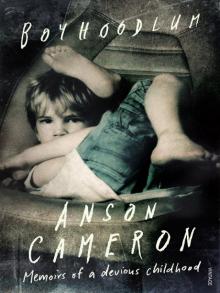 Boyhoodlum
Boyhoodlum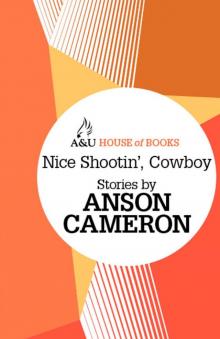 Nice Shootin' Cowboy
Nice Shootin' Cowboy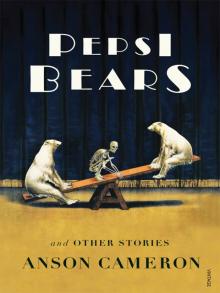 Pepsi Bears and Other Stories
Pepsi Bears and Other Stories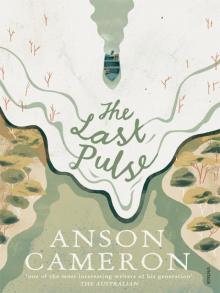 The Last Pulse
The Last Pulse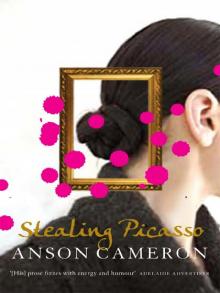 Stealing Picasso
Stealing Picasso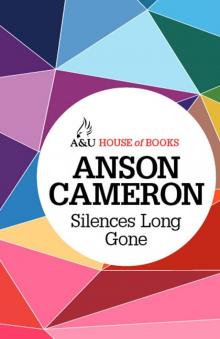 Silences Long Gone
Silences Long Gone